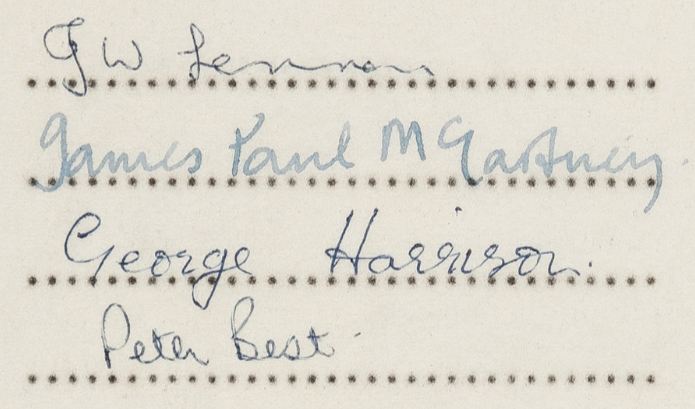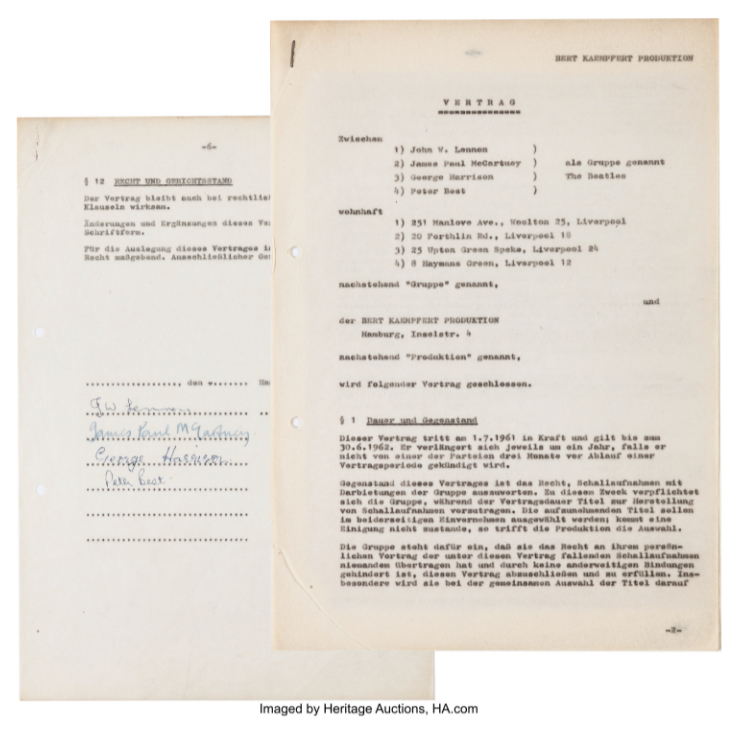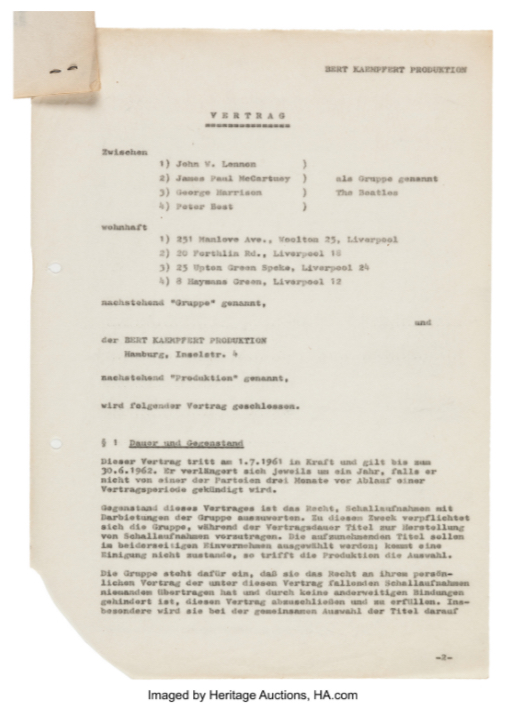Example Information:
The First Recording Contract Signed By The Beatles, For The "My Bonnie" Session (Germany, 1961). This extraordinary contract is one of the most important Beatles documents ever to be offered at auction - and perhaps the most historically important Beatles document in existence. Here is the very first recording contract signed by the group in June 1961, for the session which produced the "My Bonnie" single release. That recording would lead the still-struggling Beatles to Brian Epstein, through whose management they would achieve unprecedented worldwide success.
Written in German, six pages total, and with original signatures by the Beatles - John Lennon, Paul McCartney, George Harrison, and original drummer Pete Best - this is one of perhaps three copies executed between the group and the German music producer Bert Kaempfert. As was the practice at the time, the contract was typed onto standard weight paper with onion-skin paper beneath, forming an immediate copy of the top sheet. With multiple identical copies on hand, the parties to the agreement could sign all, so that original signatures would be affixed to each. This document is on onion-skin, and with original signatures in blue fountain pen by James Paul McCartney, and in blue ballpoint by J.W. Lennon, George Harrison, and Peter Best. This is an official legal copy of the contract and would have been executed at the same time as the top copy - the whereabouts of which are unconfirmed. This copy came to Uwe Blaschke through a private purchase in 2001.
The contract is on A4 sized paper, six pages total, approximately 8.5" x 12". The document is in overall Excellent condition, no folds or creases to the pages, and with yellowing consistent with age. An original staple is present at top left, which binds the first five pages only, the sixth, which holds the Beatle signatures, has been carefully removed from the staple for display of the page at Beatlemania Hamburg. A small piece of the first page is missing at bottom left corner, in the margin well outside of the typed text area. From the Uwe Blaschke Beatles Collection. COA from Heritage Auctions.
Fifty-five years ago, in August 1960, the still musically-developing Beatles made their first visit to the clubs of Hamburg. This initial visit would last over three months, during which time they played six nights a week, for up to eight hours a night. Over the next two years the Beatles would log a total of over 1000 hours on Hamburg stages in a grueling performance schedule which scholars - and the Beatles themselves - have noted as being crucial to their evolution into the world's greatest musical group.
During the group's second visit to Hamburg in the Spring of 1961, the noted German record producer Bert Kaempfert saw them performing at the Top Ten Club on the city's famed Reeperbahn. Liking what he heard, Kaempfert enlisted the Beatles and another Top Ten Club performer, Tony Sheridan, to spend a day recording rock & roll versions of traditional songs - which although performed in English, would likely be familiar to German audiences. "My Bonnie" was a song taught to children in German schools, and Kaempfert thought that a modern, uptempo version could be a hit. For their efforts, the Beatles - John Lennon, Paul McCartney, George Harrison, and original drummer Pete Best - were paid what amounted to less than $20 each.
The sessions with Kaempfert led to the release of the single "My Bonnie" on the German Polydor label in October 1961, which was credited to "Tony Sheridan & The Beat Brothers". A stipulation in the contract allowed Polydor to use a different group name, and Kaempfert felt that the name "Beatles" would not be readily accepted in the German market. As the contract was written entirely in German, the Beatles likely had very little understanding of the details at the time of execution. What did matter to them was that they were making a professional recording, for commercial release by an actual record label - their first.
The single achieved very modest success in Germany, but back home in Liverpool, Beatles fans who knew of the recording began asking for it in record shops, including the store owned and managed by Brian Epstein. When he learned that the requests were for a local group, Epstein paid a visit to the Cavern club to see the Beatles perform, and the rest is history. Enthralled by then now-seasoned group's talent, Epstein became their manager, and within a few months he had secured a music test with EMI producer George Martin, resulting in the recording of the group's first hit "Love Me Do."



